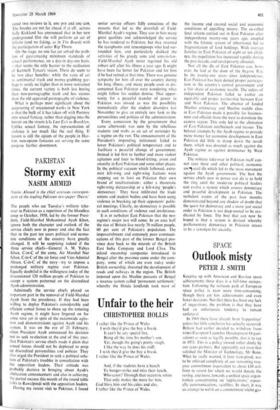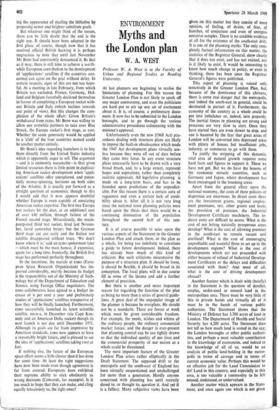Outlook misty
SPACE PETER J. SMITH
Keeping up with American and Russian space achievements these days is a full-time occupa- tion. Following the tortuous path of European space policy is even more time-consuming, though there are few achievements and even fewer decisions. Not that there has been any lack of suggestions; the problem is that they have had an unfortunate tendency to remain unilateral.
In 1969 there have already been 'happenings' galore but little conclusive has actually occurred. Britain had earlier decided to withdraw from ELDO (European Launcher Development Organi- sation) as soon as legally possible, that is to say in 1971. This is a policy viewed rather dimly by our ELDO partners. But apparently not even that satisfied the Minister of Technology, Mr Benn. What he really wanted, it later transpired, was to be relieved completely of our remaining two- year commitment (equivalent to about £10 mil- lion) in return for which we would donate the saving, and more, towards a unified space organ- isation concentrating on 'applications,' especi- ally communications, satellites. In short, it was an attempt to welsh on a commitment whilst giv-
ing the appearance of stealing the initiative by proposing newer and brighter substitute goals.
But whatever one might think of the means, there can be little doubt that the end is the right one. It should have been adopted in the first place, of course, though now that it has received official British backing it is perhaps ungracious to note that until last November Mr Benn had consistently denounced it. Be that as it may, there is still time to achieve a worth- while European contribution to the development of 'applications' satellites if the countries con- cerned can agree on the goal without delay. In certain respects, signs of this are not too hope- ful. At a meeting in late February, from which Britain was excluded, France, Germany, Hol- land and Belgium forcefully declared themselves in favour of completing a European rocket with- out Britain and Italy (which inclines towards our point of view). But this changes the com- plexion of the whole affair. Given Britain's withdrawal from ELDO, Mr Benn was willing to allow our erstwhile partners to take over Blue ' Streak, the Europa rocket's first stage, at cost. Whether the same generosity would be applied to a 'club' of the four countries named could be another matter entirely.
Mr Benn's idea regarding launchers is to buy them directly from the United States industry which is apparently eager to sell. The argument —and it is eminently reasonable—is that given limited resources there is little point in duplicat- ing American rocket development when 'appli- cations' satellites offer unexplored, and poten- tially money-spinning, horizons on both sides of the Atlantic. It is usually put forward as a straight question of economics, though to this I would add that it now appears doubtful whether Europe is even capable of emulating American rocket expertise. The first two Europa test rockets bit the dust, at an additional cost of over £40 million, through failure of the French second stage. Miraculously, the much- postponed third test rocket, fired last Novem- ber, fared somewhat better; but the German third stage cut out early and the Italian test satellite disappeared without trace. 'We don't
know where it is,' said an ELDO spokesman later —which must be the most honest, if expensive, quote for a long time. Ironically, the British first stage has performed perfectly throughout.
In the meantime, the morale at ESRO (Euro- pean Space Research Organisation) has im-
proved considerably, mainly because its budget is the responsibility not of the Ministry of Tech- nology but of the Department of Education and Science, using Foreign Office negotiators. The
ESRO collaborators have agreed to a budget in- crease of 6 per cent a year and preliminary
studies of 'applications' satellites irrespective of
how they will be finally launched. Furthermore, ESRO successfully launched its latest scientific satellite, HEOS-A, in December (via Cape Ken-
nedy and an American Delta rocket) though its next launch is not due until December 1971. Although its goals are far from impressive by
American standards, ESRO now appears to have a reasonably bright future, and is pleased to see the idea of 'applications' satellites taking root at last.
If nothing else, the future of the European space effort seems a little clearer than it has done for some time. At least the right suggestions have now been made even though agreement is far from assured. Europeans have exhibited their supreme ability to stick obstinately to wrong decisions (Concorde, for example). Is it too much to hope that they can make, and cling equally tenaciously to, the right ones?



































 Previous page
Previous page